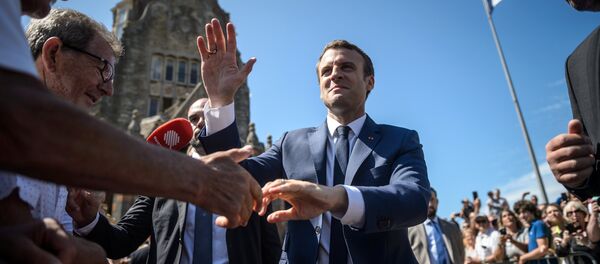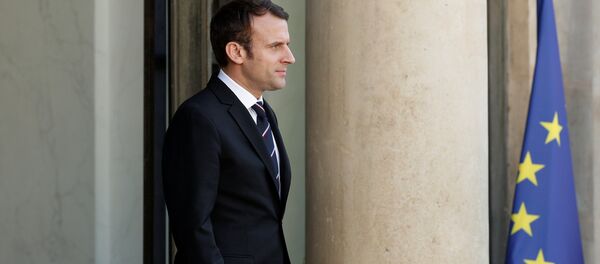According to the Odoxa poll published on Friday, REM is poised to get up to 450 seats in France's 577-seat parliament, while The Republicans could get between 70 and 95 seats that would be a considerable decrease from the 194 seats gained by its predecessor Union for a Popular Movement's (UMP) and the Socialists could get around 30 seats that would show almost a tenfold decline, as they had 280 seats in the previous parliament.
"In some respects the legislative elections are functioning like the 3rd round of the presidential election and LREM is surfing the wave of popularity that carried Macron to power," Professor of Modern French Studies at the University of Bristol Gino Raymond told Sputnik.
Under the French system, the president only is capable to enact his plans and reforms, including sensitive ones proposed by Macron such as to ease restrictions on hiring and firing workers and changing taxation, if he also has a grip over the county’s National Assembly. The looming landslide is, however, likely to ensure Macron's grip on the legislature.
"It really looks like the president's gamble has succeeded. It is right that, all across Europe, Social Democracy and mainstream Conservatism are not doing well. The old notions of Left and Right have become less important in political debate than the kind of Social Liberal 'Third Way' Macron is supporting, much like Tony Blair used to do with his New Labour," Jean-Yves Camus, a researcher with the think tank IRIS and an expert on the far right in France, told Sputnik.
Traditional Parties' Underperformance
The centrist appeal of president Macron and his novice party seemed to have even further exacerbated the seeming divide within The Republicans between Macron's advocates and those who refused to endorse him after the elimination of their own candidate, Francois Fillon, in the first round of the presidential election. The split, which became apparent during the scandal around Fillon's wife's fake employment, was driven home when Macron appointed The Republicans veteran Edouard Philippe as prime minister despite opposition to Macron by a large section of the party.
The center-right was hoping to take revenge after scandal-wrecked Fillon’s elimination, promising to claim a majority in the next parliament, yet after the first round they came a distant second and are expected to lose even more support to Macron’s party.
According to Raymond, The Republicans party has suffered hugely from a lack of leadership.
The former Republicans' opponent, the Socialist party, was looking particularly feeble after a crushing defeat in the first round of this year's parliamentary election, he stressed.
"With regard to the Socialists, their failure is truly catastrophic. The may find themselves with 20-30 seats in the new Assembly after the second round — 10 percent of what they had before the elections. It is their worst performance in the history of the Fifth Republic. Instead of limiting the damage after the failure of its candidate, Benoit Hamon, in the presidential election, the party has lost even more of its supporters to Macron and LREM," Raymond said.
According to the expert, the Socialists' legislative chances have been further undermined by the party tearing itself apart after the presidential election, with rivals trying to create their own movements within the party.
Even though an expected victory of REM and its allies in this year's legislative election by such a significant margin could repel rising right-wing nationalism and populism, represented by Le Pen’s National Front (FN) party, and undermine the traditional class-based left-right division, the experts are not rushing to conclude that the future of France's mainstream parties of the left and right will depend on the outcome of the legislative vote.
"Saying that the old parties have been buried for good is premature. The danger for Macron and LREM is that if they end up with a massive majority in the National Assembly (say somewhere around 400 of the 577 seats) they will have no excuse for failure. If, in 5 years' time, there has been no significant progress in bringing down, in a major way, the near 10 percent rate of unemployment (which is what troubles French voters most), significant numbers of voters may start to look for alternatives — even old and familiar ones," Raymond stated.
Low Voter Turnout
Left-wing Melenchon’s Unsubmissive France (La France Insoumise) and other parties explained their underperformance in the first round by the low turnout after failing to mobilize their electorate, which consists of young voters.
According to the results, some 50 of Melenchon’s candidates have made it to the second round of the legislative election. Polls say the party can expect 11-21 deputies in the incoming parliament.
France saw the record abstention of a little over 50 percent during the first round of the parliamentary election. According to the French Interior Ministry, 48.71 percent took part in the first round of the vote this year, while the turnout at the first round of the parliamentary election in 2012 was 57.22 percent.
Le Pen also blamed a severe setback of her party in Sunday's vote on a record low turnout. "This catastrophic abstention rate should raise the question of the voting rules which keep millions of our compatriots away from the polling stations," she said on Monday.
Camus believes that the abstention was due to a certain fatigue of voters, tired of never-ending political campaigning since the presidential campaign started last September.
"The low turnout is because we are in a political campaign since autumn 2016 and the people are weary. It is also because the system of the Fifth Republic gives predominance to the president and parliament is losing some of its powers in policy-making: most legislation that is passed emanates from the cabinet, not the MPs," he said.
Camus also underlined that, as for the FN, a better turnout in the second round would not do much for the party as in constituencies where the FN candidates have a narrow lead, a higher turnout would likely mean an anti-FN coalition. The expert pointed out that without proportional representation, the FN was always weaker in the legislative election when compared to the presidential one.






